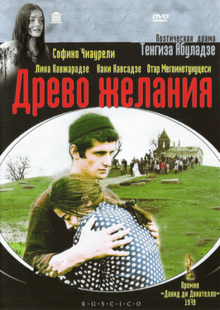The Wishing Tree (film)
| The Wishing Tree | |
|---|---|
 | |
| Directed by | Tengiz Abuladze |
| Written by |
Revaz Inanishvili Tengiz Abuladze |
| Starring |
Sofiko Chiaureli Ramaz Chkhikvadze |
| Music by |
Bidzina Kvernadze Jacob Bobokhidze |
| Cinematography | Lomer Akhvlediani |
| Distributed by |
Cannon Film (US theatrical) Ruscico (DVD) |
Release dates |
|
Running time | 107 minutes |
| Country | Soviet Union (Georgian SSR) |
| Language | Georgian |
The Wishing Tree (Georgian: ნატვრის ხე , natvris khe, Russian: Древо желания, drevo zhelania) is a 1977 Georgian drama film directed by Tengiz Abuladze. It won the Lenin Prize, the All-Union Film Festival main prize and other prizes. The film is based on Giorgi Leonidze's short stories. The textures of folk legend and striking visual allegory permeate The Wishing Tree, an episodic pastorale set in a pre-revolutionary Georgian village and spanning four seasons in the lives of various village characters. Some twenty-two stories are woven into the narrative, which centers on a beautiful young woman who is forced to marry a man she does not love; her unsanctioned love for another leads her to ritual disgrace and sacrifice.
Plot
The Wishing Tree begins with a gorgeous scene, a field of roses, where an even more beautiful horse, named Tetra, is in agony. A young man, Gedya (Soso Jachvliani) rushes to his rescue, but loses the battle, and his horse dies surrounded by roses. This scene will certainly be remembered, as Abuladze will once again bring the audience back to the red roses, where in the end, only the careful viewer will understand its deep meaning. By the time Gedya finds the strength to recover from his loss, he and the entire village is stunned by the incredible beauty of a woman who has come to their town- Marita (Lika Kavjaradze). As soon as Gedya and Marita see each other, they fall in love. But their happiness won`t last forever. The elders of the village have decided to marry her to a wealthy young man against her wish…
The Wishing Tree is set in a pre-Revolutionary Georgian village, where at that time they had their own rules and prejudices that were the law. Even though a man and a woman are equal in their society, Abuladze brings an academic meaning to it. He makes it clear that having privilege does not mean you may take advantage of it. Abuladze crafted every scene with so many symbols and meanings that it is hard to cover all of them here. However, one thing must be emphasized in The Wishing Tree is how Abuladze shows that even after a huge disaster, a thunderstorm that ruins everything in its path, life still goes on; the Wishing Tree will still be there, waiting, for the one who will finally make the right wish…[1]
Cast
- Lika Kavjaradze as Marita
- Soso Jachvliani as Gedya
- Zaza Kolelishvili as Shete
- Kote Daushvili as Tsitsikore
- Sofiko Chiaureli as Pupala
- Kakhi Kavsadze as Rebel Iorami
- Erosi Manjgaladze as Mumbula
- Otar Megvinetukhutsesi as Ertaozi
- Ramaz Chkhikvadze as Priester Okhrokhine
- Gogi Gegechkori as Chachika
- Sesilia Takaishvili as Maradia
- Giorgi Khobua as Batula
- Givi Berikashvili as Padgula
- Jemal Gaganidze as Tagria
- Boris Tsipuria as Qoria
- Ya Khobua as Mother of Gedia
- Mzia Makhviladze as Ninole
- Dato Papuashvili as Azaria
- Givi Chichinadze as Ipro
- Dato Abashidze as Gaulatsune
- Tina Burbutashvili as Mother of Shete
- Shota Skhirtladze as Herder
Music
The film score is composed by Georgian composers Bidzina Kvernadze and Jacob Bobokhidze.
Awards
The film won several film festival prizes.
| Year | Prize |
|---|---|
| 1977 | Main prize of All-Union Film Festival |
| 1977 | Golden aurochs at VI Film festival in Tehran |
| 1978 | Special prize at Karlovy Vary International Film Festival |
| 1979 | Shota Rustaveli Prize |
| 1979 | David di Donatello for Best Foreign Film |
| 1988 | Lenin Prize for Tengiz Abuladze |
References
- ↑ bampfa.berkeley.edu